Lack of dental care is incredibly cruel and inefficient: dentist
On April 26, Canadian Doctors for Medicare hosted a webinar on the challenges and possibilities of dental care in Canada. The panelists welcome the expansion of public dental care in Canada but want the government to do more to make dental care more accessible and universal.
In his introductory remarks, Dr. Brandon Doucet, a dentist, founder of the Coalition for Dentalcare and author of the new book, About Canada: Dental Care, said the lack of dental care is “incredibly cruel and inefficient.”
“Having missing teeth or visible decay can affect employability, which perpetuates the cycle of poverty. In the time people lack access to care, disease only worsens, which can lead to potentially life-threatening infections,” said Doucet.
Doucet moderated the webinar that featured a dentist, an emergency room doctor and a journalist. The webinar is available for viewing here –
Doucet noted one in three Canadians lack dental insurance and over one in five Canadians avoid going to the dentist because of financial constraints. According to Doucet, those rates are on the rise with work becoming more precarious and dental insurance not being provided by employers of a growing non-unionized workforce.
Doucet reminded the audience that inadequate spending on public health care has created gaps in coverage. Canada is even behind the U.S. in spending on public dental care.
“Lacking access to dental care is problematic. It forces poor oral health care onto people. Poor oral health leads to many consequences like diabetes complications, worsening heart disease and increased rates of aspiration pneumonia,” said Doucet.
Doucet said the Liberal-NDP agreement aims to give more people access to dental care but that it needs to be a stepping stone to a truly universal dental care that ensures everyone has access to timely and comprehensive care.
Mary Otto, an American medical journalist and author of Teeth: Beauty, Inequality, and the Struggle for Oral Health in America, shared a fascinating history of dental care in the U.S.
Otto started covering oral health when a young boy died of dental sepsis, a complication of an abscessed tooth, in Washington, D.C. His family spent a quarter of million dollars to try and save him.
Dr. Hasan Sheikh, an emergency physician with Canadian Doctors for Medicare, said he sees patients in the emergency department who really need to see a dentist but have nowhere else to go.
“It’s a very strange system where one part of your body is treated as not part of your overall health,” said Sheikh.
“Your smile is such an important part of your mental health. It’s very strongly related to self-esteem and to social interactions and … employability,” said Sheikh.
Dr. Paul Allison is a dentist and professor in the Faculty of Dental Medicine and Oral Health Sciences at McGill University. He told the audience that dental decay is the most common non-communicable disease in the world. He called for alternative delivery models that are more accessible and integrated with other health care.
On March 28, the Trudeau government’s budget earmarked $13-billion to expand dental care to families earning less than $90,000 a year. Meanwhile, seniors on fixed pensions that fall below the poverty line are calling the Canadian Health Coalition daily, wanting to know when exactly they will be able to afford to see a dentist. They need dental care coverage now.
Tracy Glynn is the National Director of Projects and Operations for the Canadian Health Coalition

